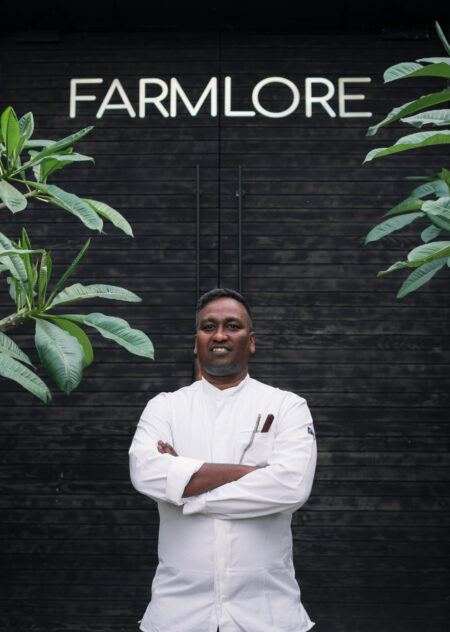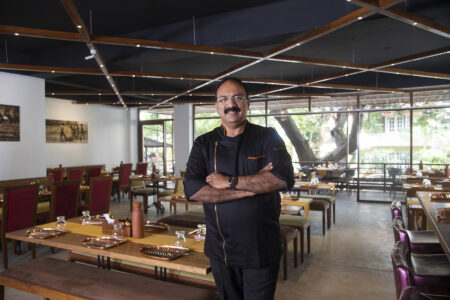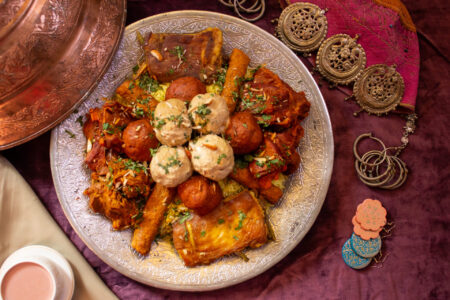Julia Komp interacts continuously with the team of chefs at Ottimo, ITC Gardenia, Bengaluru, issuing a steady stream of instructions, accentuated by emphatic nods and smiles. Despite the pressure of a plated service for 50 guests, the team smiles back — some of them even have the time for a joke or two. Not what you would expect in a kitchen where the visiting chef is presenting her cuisine with barely 48 hours of preparation, part of her travels across 19 countries, cooking, exploring ingredients and understanding local gastronomy.
Komp works with single-minded precision, moving back and forth from the kitchen, plating with concentration and neat efficiency. Everything about her is both relaxed and focussed; she pauses mid-service to pose casually for a photographer, and has the patience to change into a brilliant blue silk sari at the end of a hectic evening. The same focus won her a Michelin star at the age of 26, at the restaurant Schloss Loersfeld, Germany.
Komp has quickly established her own, distinctive style of cooking. Spices, the ultimate luxury goods traded across continents as far back as 3500 years ago, define her dishes in the most modern and imaginative way. As part of the ITC Hotels’ Global Tastes initiative of creating a platform for cultural exchange through cuisine, Komp has just worked her way across five Indian cities, presenting a menu based on her travels. The flavours are light, distinctive, yet harmonious.
The Hiramasa Kingfish is perfectly textured, the inflexions of tandoori masala just strong enough. It is served with moulded lentils and the unexpected flavours of Rambutan.
A delicate, minty quenelle of ice cream accents a dish of three kinds of tomatoes with passionfruit, as simultaneously, a tremulous sphere of green tomato explodes in the mouth. Each of the elements is clear and refined on its own, exquisite when combined. Komp blends modern technique with absolute flavour drawn from her experience of multiple cuisines, and synthesizes them elegantly, vividly, onto the plate. Between her visit to India, enroute to Brazil, she spoke with Kaveri Ponnapa about travel, spices, her life in the restaurant kitchen and teamwork.
Kaveri Ponnapa: Taking on a culinary internship at the age of 14 must have required great determination. Did you always want to make a career in cooking? Julia Komp: We had to take an internship at school. My grandparents always took me to good hotels and restaurants, so I was familiar with hotels, I liked the life, so I chose to intern in one. I also noticed that all the good- looking boys were going to the gym at the hotel! I found room service boring, and too much bickering in other areas of work. But the kitchen was fun; time passed very quickly. I was working with much older people, and they were surprised at how much I knew about food. I began to love cooking, and the time I spent in the kitchen. I continued there.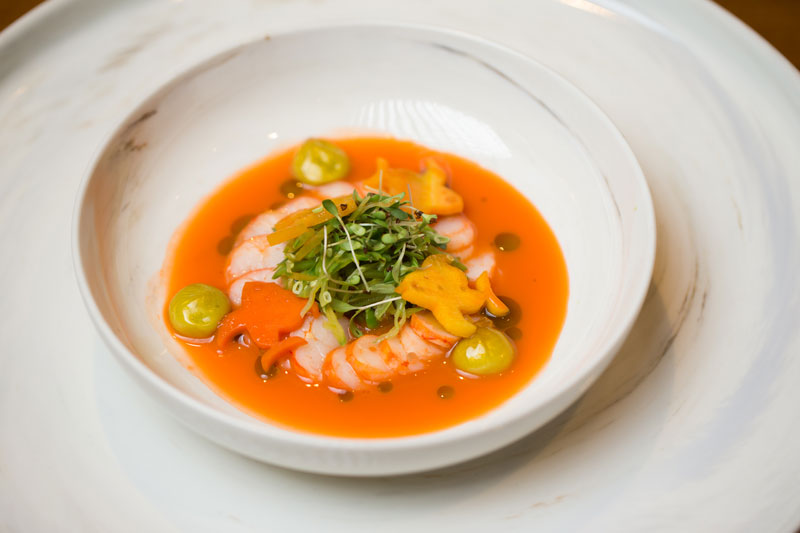
KP: In what way would you say your style is different from other German chefs?
JK: In Germany we have a lot of good chefs. Many of them go in the direction of seasonal, local German farm produce. I am not afraid to use a lot of flavour and experiment, especially with the use of spice, or doing things differently — sometimes we use fruit in place of vegetables. People are surprised and interested by what they do not expect.
KP: How would you describe your current culinary style?
JK: My cuisine is very light, spicy and fruity. But not spicy like chilli: it’s more of cardamom and all the other spices you use in India. I think of aromatics like lemon grass and kaffir limes as spices too, as much as star anise and clove. My training was in traditional French and Austrian cuisine; all the basics and techniques that I learnt in the last 10 years, I now translate to my style of fusion cuisine. I add a lot of flavours from Asian, Indian and Arabic countries to my food.
KP: You use spices in subtle and unexpected ways. What sparked this interest?
JK: I always preferred to eat spicy food. If it’s a choice between spaghetti and kebab, I would choose kebab. My grandmother had a house in Tunisia and our neighbours had a small, artisanal spice business. Living and cooking there gave me a taste for spice. My personal preference is for Oriental food. For me, it’s easy to cook what I like, what I am happy with, because that is what you cook best.
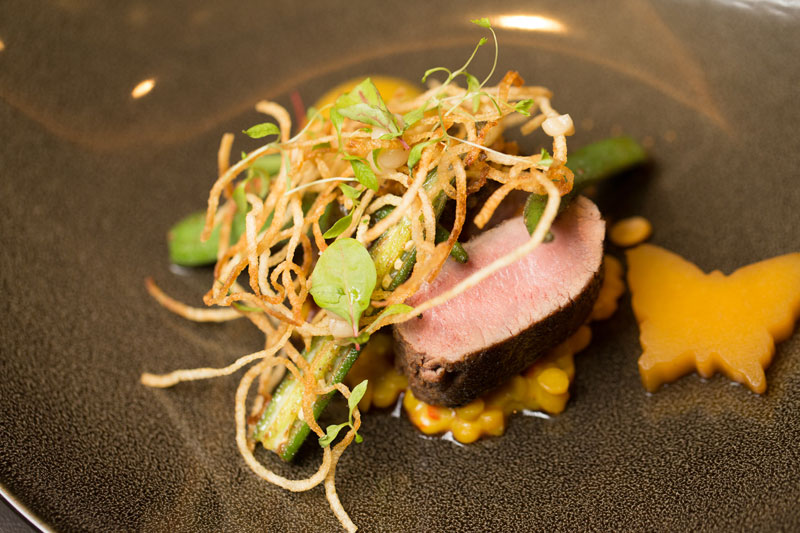
KP: The courses that you created and served were both refined and flavour intense. Please tell us about some of the techniques that you use to achieve this result.
JK: In Germany we use a lot of techniques, but for that you need a big supporting team which is difficult while travelling. I prefer to work with what is available: good quality ingredients, and using some techniques to maximum effect. For instance, with spheres, you can achieve an intense explosion of flavours on the palate which is always memorable. Other things are simple —you can serve a carrot, but you can work on form and taste in presentation. In this menu, I have concentrated on taste to showcase my travels across Japan, Thailand, India, the Middle East, by trying to capture some of the flavours I experienced in each country.
KP: After 7 months of travel across 19 countries, what do you hope to take back to your own restaurant and cooking from your experiences?
JK: I learned a lot of things as I worked in different styles of kitchens. Some were Michelin starred restaurants, but also a traditional Pho kitchen in Vietnam and a small curry kitchen in Thailand. These were local kitchens where they served the local specialties. I also worked in a family restaurant in Morocco, where three women in the kitchen were cooking and serving their family recipes handed down the generations. I have notebooks filled with information I wrote down. There was so much. I took a lot of pictures, and when I look at them, the ideas come back. Now I need time in my own kitchen to reflect, to think how to put all this experience and these ideas into my cuisine. Right now, I don’t have a team. I need a team, it’s always good to cook as a team.
KP: Are there any spices that you learned about for the first time, on this visit to India?
JK: I know all the spices used in India, especially since I interned at an Indian restaurant in Malaysia. What they use a lot are the brown or black mustard seeds. In Germany we use only the light ones. Your masala is like our Christmas spices; but people use it very carefully, maybe one clove, or a stick of cinnamon in basic stock. Here, in India, people add a lot of spices. I love this: the full power, the full umami. You have to know how to combine the flavours: fruity, salty, spicy, to make an outstanding dish.
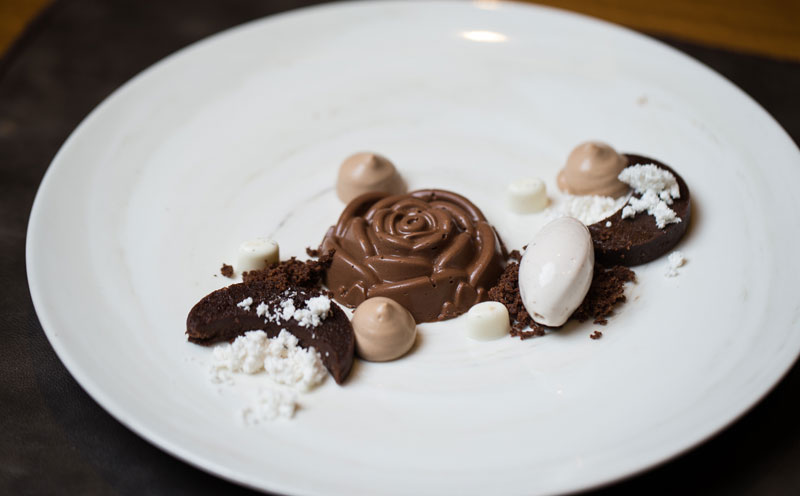
KP: Is there any single Indian cooking technique that struck you as unique, which you may like to experiment with in the future? JK: I love Indian pickles. This is a wonderful taste. Everywhere in the world there are pickles. In Germany we make them in such a simple way: maybe just cucumber, vinegar, salt and water. In India, there are so many complex flavours: salty, spicy, sweet. I love pickles!
KP: At Ottimo, Bengaluru, you were leading a team of chefs you were working with for the first time. Yet you looked very relaxed, and your team was relaxed too. How did you keep the atmosphere stress-free?
JK: It’s very hard for women chefs to work in new kitchens where you don’t know anyone, the expectations are different. Men are accepted quite naturally. It’s extremely important for me to have a team that is like a family. In Germany, my team worked very hard for me, and I liked to share my successes with them. In Bangalore, the team was so young. There was a boy who was just beginning his training as a chef, he barely knew anything, but he was motivated, trying his best to do whatever I told him to. I love that. I try to keep things easy. I respect their work, and they respect mine. When everyone is happy, the results are good, and everything works well.
KP: What is your new restaurant going to be like? What can we expect in terms of ambience and food?
JK: It will be very light, casual, with touches of Morocco in the décor. It will not be an Indian or Asian restaurant. I want an open kitchen, where my guests can see me working. It will certainly be Michelin-quality cuisine, I have no doubt that I am aiming for a second star! The cuisine will be influenced by Asian and Arabic flavours, which will be used with more precision. The presentations will be more evolved. I hope it will be a really nice restaurant.
By: Kaveri Ponnapa
Images Courtesy: Photo credits and copyright: Melanie Bauer


